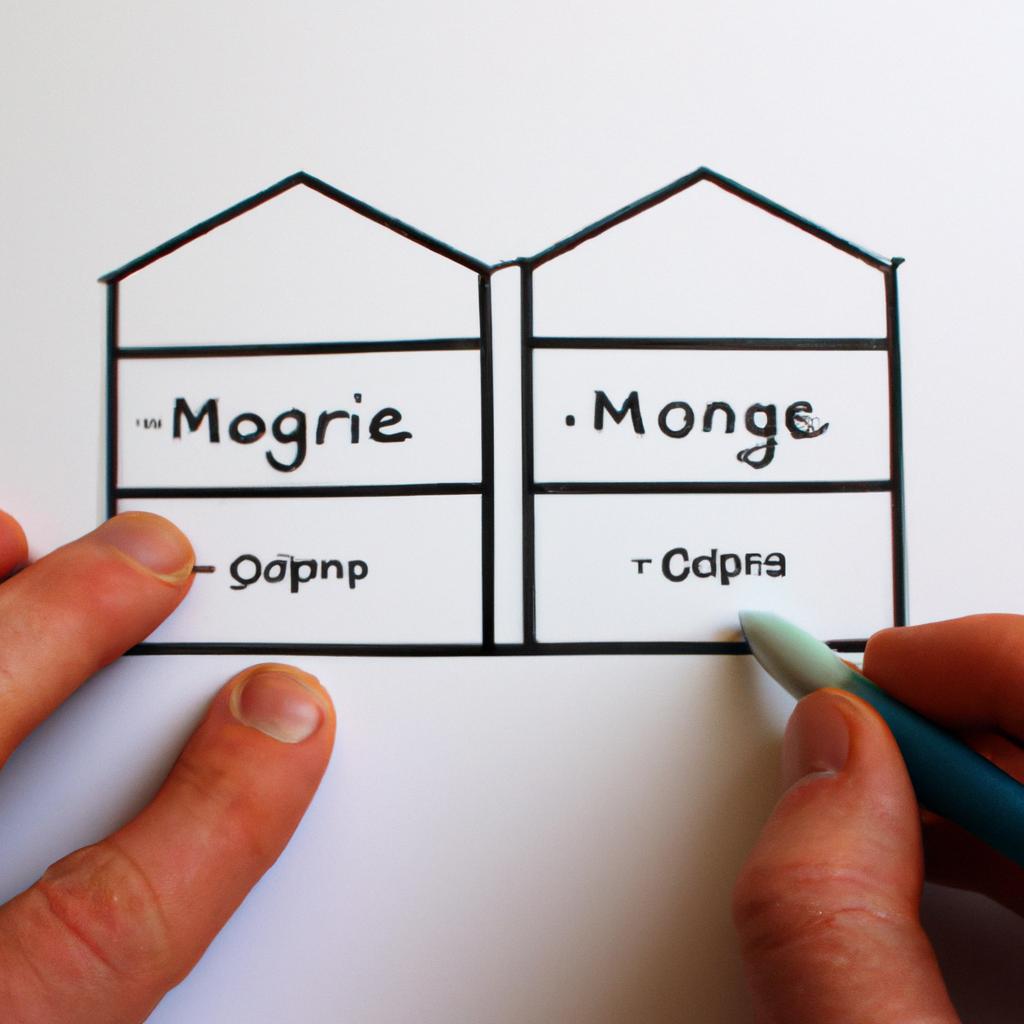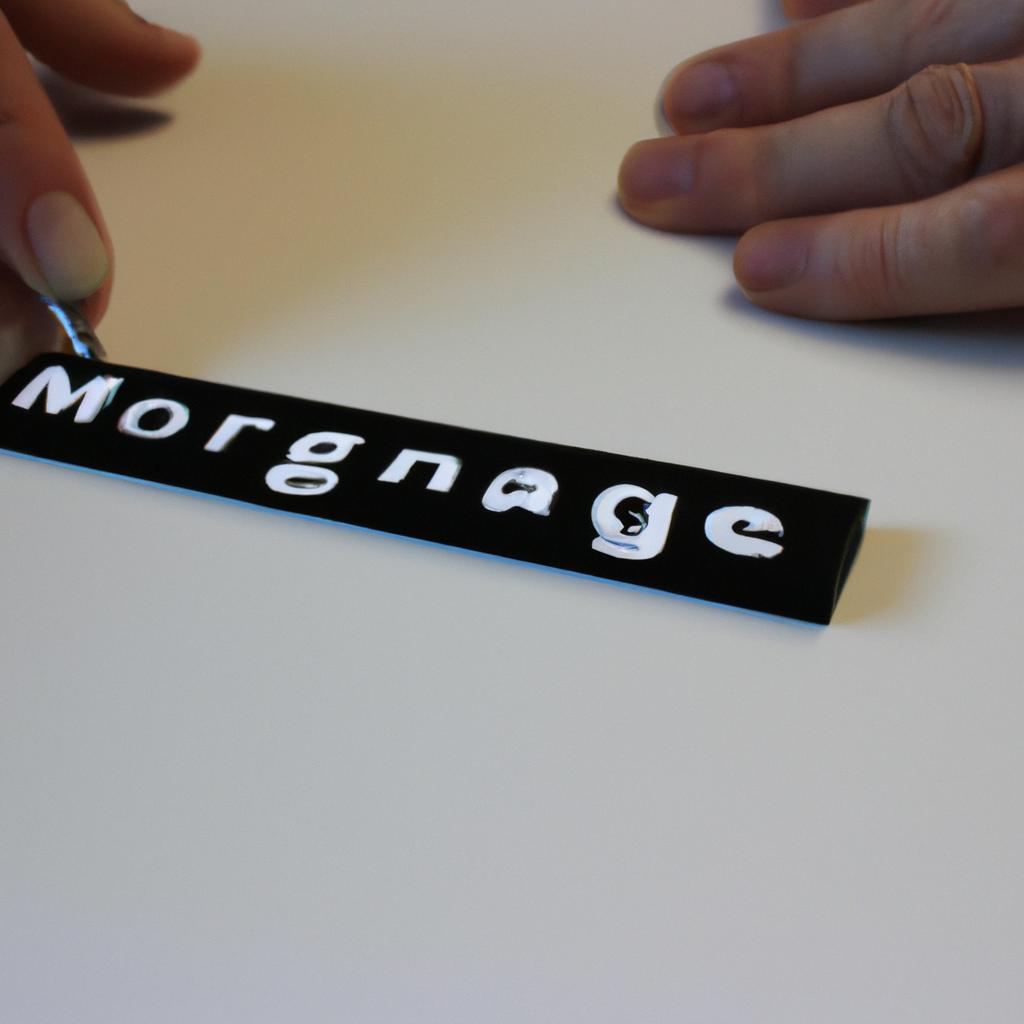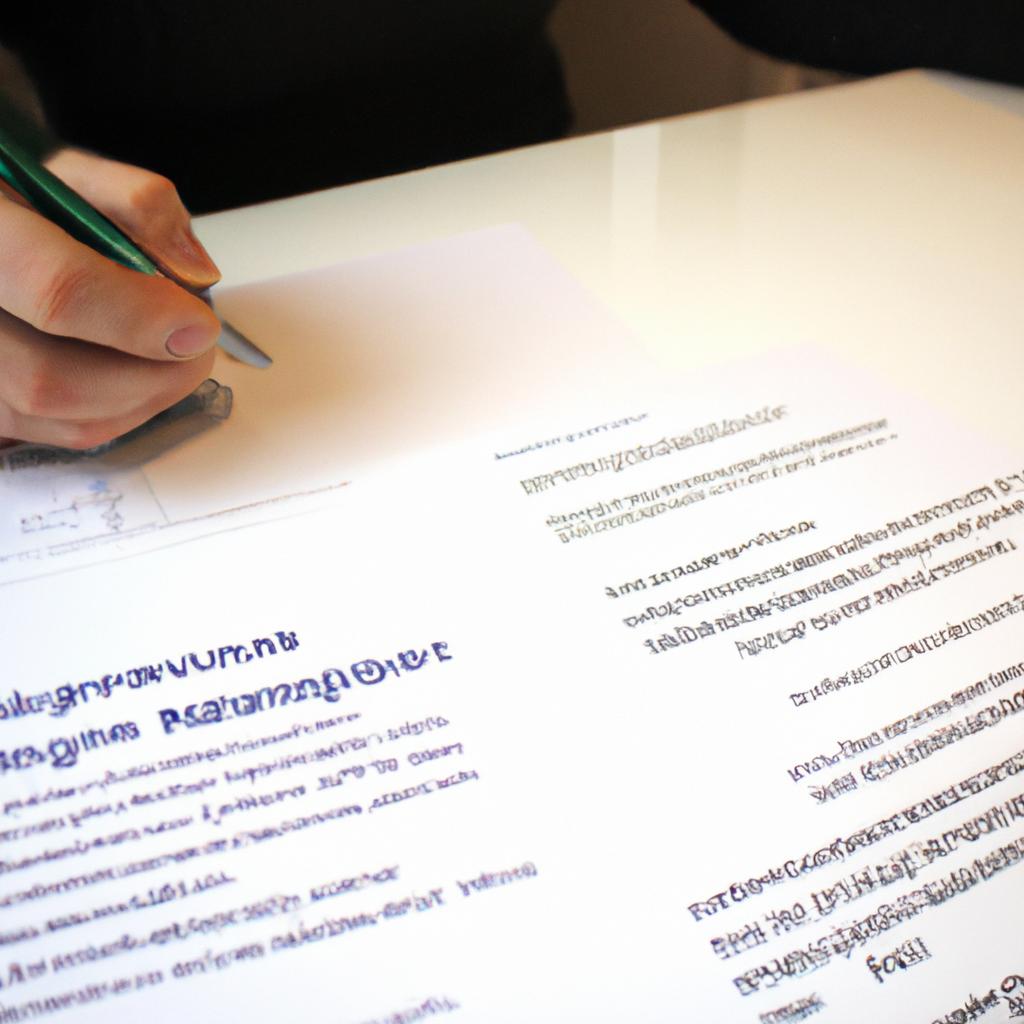Mortgage refinancing can be a strategic financial move for homeowners looking to lower their monthly mortgage payments or secure a better interest rate. However, before embarking on this journey, it is crucial to gain a comprehensive understanding of the costs associated with refinancing. This guide aims to shed light on the intricacies of calculating refinancing costs and provide homeowners with an informative framework when making such important financial decisions.
Consider Sarah, a homeowner who recently purchased her house five years ago with a 30-year fixed-rate mortgage. As interest rates have significantly decreased since then, Sarah wonders if she should refinance her mortgage in order to take advantage of these more favorable terms. She understands that although refinancing may present long-term benefits, there are immediate costs involved that need careful consideration. By delving into the various expenses tied to refinancing, such as closing costs, origination fees, and prepayment penalties, this article will equip individuals like Sarah with the necessary knowledge to make informed choices regarding their mortgages.
Understanding Refinancing Costs
Imagine you are a homeowner named Sarah, who purchased her home five years ago with a fixed-rate mortgage. Recently, Sarah has been considering refinancing her mortgage to take advantage of lower interest rates. However, before making a decision, she wants to understand the potential costs involved in this process.
Refinancing a mortgage involves obtaining a new loan to replace an existing one. While it may offer benefits such as reducing monthly payments or shortening the loan term, it is essential for homeowners like Sarah to comprehend the various costs associated with refinancing.
Firstly, there are upfront fees that borrowers need to consider when refinancing their mortgages. These can include application fees, origination fees, appraisal fees, and title search fees among others. It is crucial for homeowners like Sarah to carefully review these charges as they can vary depending on lenders and individual circumstances.
Secondly, closing costs play a significant role in determining the overall cost of refinancing. Closing costs typically comprise attorney fees, underwriting fees, prepaid taxes and insurance premiums, and other miscellaneous expenses related to transferring ownership of the property. It is important for homeowners like Sarah to be aware of these costs as they will directly impact the total expense of refinancing.
Thirdly, homeowners should consider any potential penalties or prepayment fees associated with their current mortgage terms. Some loans impose charges if borrowers pay off their loans early or refinance within a certain timeframe. Homeowners must evaluate whether these penalties outweigh the potential benefits of refinancing.
To illustrate these points further:
-
Upfront Fees:
- Application fee: $500
- Origination fee: $2,000
- Appraisal fee: $400
- Title search fee: $300
-
Closing Costs:
| Attorney Fee | Underwriting Fee | Prepaid Taxes & Insurance | Miscellaneous Expenses |
|---|---|---|---|
| $1,000 | $900 | $2,500 | $400 |
Lastly, homeowners should also consider the potential long-term financial implications of refinancing. While it may lower monthly payments in the short term, extending the loan term may result in paying more interest over time. It is crucial for Sarah and other homeowners to weigh these factors carefully before deciding on whether or not to refinance.
Transitioning into the subsequent section about “Factors Affecting Refinancing Costs,” understanding the various costs involved is just one aspect of making an informed decision. Homeowners must also take into account several factors that influence refinancing costs beyond these upfront fees and closing costs.
Factors Affecting Refinancing Costs
Imagine you are a homeowner named Sarah who is considering refinancing her mortgage to take advantage of lower interest rates. Sarah wants to understand the costs associated with refinancing before making a decision. By understanding these costs, she can evaluate whether refinancing would be financially beneficial for her in the long run.
There are several factors that contribute to refinancing costs, which can vary depending on individual circumstances. Here are some key points to consider:
-
Loan Origination Fees: When applying for a new mortgage, lenders often charge origination fees to cover administrative expenses. These fees typically range from 0.5% to 1% of the loan amount and can include charges for processing paperwork, underwriting the loan, and conducting appraisals.
-
Appraisal Costs: Before approving a refinance application, lenders require an appraisal to determine the current value of the property. The cost of this appraisal varies based on factors such as location and property size but generally falls within the range of $300-$500.
-
Title Search and Insurance: During the refinancing process, a title search is conducted to ensure there are no outstanding liens or legal issues related to the property’s ownership. Additionally, lenders may require borrowers to obtain title insurance, protecting against any unforeseen claims on the property’s title. These expenses usually amount to around 0.5% – 1% of the loan amount.
-
Prepayment Penalties: Some mortgages come with prepayment penalties if homeowners pay off their loans early through refinancing or other means. It’s crucial for borrowers like Sarah to review their original mortgage agreement carefully and assess any potential penalties they might incur when deciding whether refinancing makes financial sense.
To further illustrate how these costs can impact homeowners like Sarah emotionally and financially, here’s an example scenario:
| Cost Item | Amount ($) |
|---|---|
| Loan Origination Fees | $3,500 |
| Appraisal Costs | $400 |
| Title Search and Insurance | $2,000 |
| Prepayment Penalties | Depends on original mortgage agreement |
In this hypothetical case, Sarah would need to consider the total cost of refinancing by adding up all these expenses. By doing so, she can evaluate whether the potential long-term savings from a lower interest rate outweigh the upfront costs.
Understanding the various factors that contribute to refinancing costs is crucial for homeowners like Sarah who are considering this financial decision.
Now let’s delve deeper into the different types of costs associated with mortgage refinancing to gain a comprehensive understanding of each expense category.
Types of Refinancing Costs
When considering refinancing your mortgage, it is crucial to understand the various factors that can impact the overall cost of this financial decision. By comprehending these key elements, you will be better equipped to make an informed choice and navigate through the complex landscape of refinancing costs.
To illustrate the significance of these factors, let’s consider a hypothetical scenario: John has been paying his current mortgage for five years and wants to refinance to take advantage of lower interest rates. He approaches several lenders to explore his options but finds himself overwhelmed by the different fees and expenses associated with refinancing. Understanding the following factors can help John grasp why each aspect affects his potential refinancing costs:
-
Loan-to-Value Ratio (LTV):
- The LTV ratio represents the percentage of your home’s value that you are borrowing.
- Higher LTV ratios often result in higher interest rates and additional costs due to perceived risk.
-
Credit Score:
- Your credit score plays a significant role in determining the interest rate offered by lenders.
- Better credit scores generally lead to more favorable terms, while lower scores may require higher rates or additional fees.
-
Property Appraisal:
- An appraisal provides an estimate of your property’s market value.
- The outcome influences loan eligibility, as well as potential charges related to underwriting or escrow requirements.
-
Debt-to-Income Ratio (DTI):
- DTI compares your monthly debt obligations against your income.
- A high DTI ratio may affect both eligibility and cost, potentially leading to increased fees or higher interest rates.
Understanding these factors helps borrowers like John anticipate potential refinancing costs and evaluate whether pursuing this option aligns with their financial goals. However, it is important to note that every situation differs, so consulting with a mortgage professional is essential for personalized guidance tailored to individual circumstances.
In the upcoming section, we will explore the various types of refinancing costs to provide a comprehensive understanding of the expenses associated with mortgage refinancing and how they contribute to the overall financial impact. By familiarizing yourself with these costs, you will be better prepared to make informed decisions regarding your refinancing journey.
Calculating Closing Costs
Calculating Refinancing Costs: An Informative Guide for Mortgage Refinancing
Types of Refinancing Costs
As we explored in the previous section, refinancing a mortgage involves various costs. Let’s now delve deeper into understanding how to calculate these costs accurately. To illustrate this, let’s consider an example scenario where John is considering refinancing his mortgage to take advantage of lower interest rates and reduce his monthly payments.
-
Origination Fees:
Origination fees are charges levied by lenders to cover the cost of processing a loan application. These fees typically range from 0.5% to 1% of the total loan amount. For instance, if John wants to refinance a $200,000 mortgage with a lender charging an origination fee of 0.75%, he would need to pay $1,500 as part of the refinancing process. -
Appraisal Fees:
Appraisal fees are incurred when an appraiser assesses the value of your property during the refinancing process. This step helps determine whether your home has enough equity to secure the new loan. On average, appraisal fees can range between $300 and $500 depending on factors such as location and property size. -
Credit Report Fees:
Lenders require credit reports to evaluate your creditworthiness before approving a refinanced mortgage. These fees typically fall within the range of $30 to $50 per report pulled by the lender or their designated agency. -
Title Search and Insurance Fees:
Title search fees cover the cost associated with verifying ownership records and ensuring there are no liens or claims against your property that could affect its marketability as collateral for the new loan. The title insurance protects both you and your lender against potential legal issues related to ownership rights or any hidden encumbrances on your property’s title deed.
Emotional Impact Bullet Points:
- By gaining awareness about different types of refinancing costs, you can make more informed decisions regarding your mortgage refinancing options.
- Understanding the breakdown of these costs helps you plan and budget accordingly, ensuring there are no surprises along the way.
- Being aware of potential fees allows you to compare offers from different lenders effectively, selecting one that aligns with your financial goals.
- By calculating refinancing costs accurately, you can evaluate whether the benefits outweigh the expenses involved in pursuing a refinance.
Table: Refinancing Costs Comparison
| Cost Type | Average Range ($) |
|---|---|
| Origination Fees | $1,000 – $2,000 |
| Appraisal Fees | $300 – $500 |
| Credit Report Fees | $30 – $50 |
| Title Search & Insurance Fees | $500 – $900 |
By taking into account these various factors and utilizing resources such as online calculators or consulting with professionals like mortgage brokers or loan officers, homeowners like John can gain a clearer understanding of the overall cost implications associated with their refinancing decision. With this knowledge in hand, they will be better equipped to proceed with confidence towards achieving their desired financial outcomes.
Moving forward to estimating appraisal fees…
Estimating Appraisal Fees
Calculating Refinancing Costs: An Informative Guide for Mortgage Refinancing
In the previous section, we discussed how to calculate closing costs when refinancing your mortgage. Now, let’s explore another important aspect of refinancing – estimating appraisal fees.
To better understand the impact of appraisal fees on your overall refinancing costs, consider this hypothetical scenario:
Imagine you purchased a house five years ago for $250,000 and are now considering refinancing due to lower interest rates. The current market value of your home is estimated at $300,000. As part of the refinancing process, you will need an appraisal to determine the updated value of your property.
Estimating appraisal fees can vary depending on several factors. Here are some key points to consider:
-
Property Type: Different types of properties may require different levels of expertise during the appraisal process. For example, a single-family home may have a standard fee structure, while larger or more complex properties such as multi-unit buildings or commercial spaces may incur higher appraisal fees.
-
Location: Appraisal fees can also be influenced by the location of your property. In areas with high demand or unique characteristics, appraisers may charge higher fees to account for their specialized knowledge and research required.
-
Size and Condition: The size and condition of your property can affect appraisal fees as well. Larger homes or those in need of extensive repairs might necessitate more time and effort from the appraiser, resulting in higher charges.
-
Appraiser Selection: The choice of appraiser can impact the cost as well. It’s essential to work with reputable professionals who provide accurate valuations but also offer competitive pricing within the industry standards.
Consider this table showcasing potential ranges for appraisal fees based on various property types:
| Property Type | Estimated Range of Appraisal Fees |
|---|---|
| Single-Family | $300 – $500 |
| Condominium | $250 – $400 |
| Multi-Unit | $500 – $800 (varying with units) |
| Commercial Space | $1,000 and above |
By understanding the factors influencing appraisal fees and having an estimated range in mind, you can better plan your refinancing costs. Remember that these figures are approximate and may vary based on individual circumstances.
As we’ve explored estimating appraisal fees, it’s crucial to analyze other aspects of refinancing as well.
Understanding the potential cost savings from refinancing is essential, but it’s equally important to assess when those savings would outweigh the upfront expenses. Let us now explore analyzing the break-even point.
Analyzing the Break-Even Point
To determine the value of your property and assess its suitability for refinancing, an appraisal is typically required. This process involves a professional appraiser evaluating various factors such as location, condition, size, and recent sales data of comparable properties in the area. The cost of an appraisal can vary depending on several factors.
For instance, let’s consider a hypothetical case study involving Sarah who wants to refinance her mortgage. She lives in a suburban neighborhood where housing prices have been steadily increasing over the past few years. Based on initial research, Sarah estimates that the average appraisal fee in her area ranges from $300 to $500.
When estimating appraisal fees for your own refinancing journey, it is important to keep these key considerations in mind:
- Location: Appraisal costs may differ based on geographical regions due to variations in market conditions and demand for appraisers’ services.
- Property type: Different types of properties (e.g., single-family homes, condos) might require different levels of assessment complexity, which could impact the overall cost.
- Size and features: Larger properties or those with unique features may require additional time and effort from the appraiser, potentially resulting in higher fees.
- Timeframe: Urgent requests or peak periods when many homeowners are seeking appraisals may lead to increased pricing due to limited availability.
| Location | Average Fee Range |
|---|---|
| Urban | $400 – $700 |
| Suburban | $300 – $500 |
| Rural | $200 – $400 |
This table serves as an example showcasing typical price ranges; however, actual fees may still deviate from these averages depending on local market conditions.
In summary, estimating appraisal fees during the mortgage refinancing process requires considering factors such as location, property type, size and features, as well as the timeframe in which you require the appraisal. By understanding these variables and conducting thorough research, you can better anticipate the costs associated with this stage of refinancing and make informed decisions moving forward.
 SMI Loan
SMI Loan



